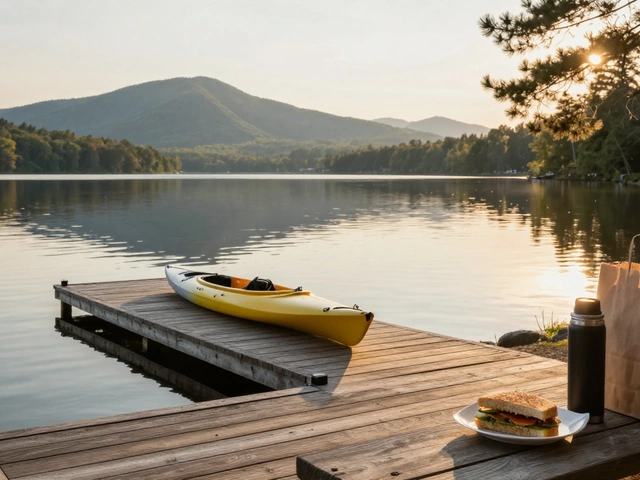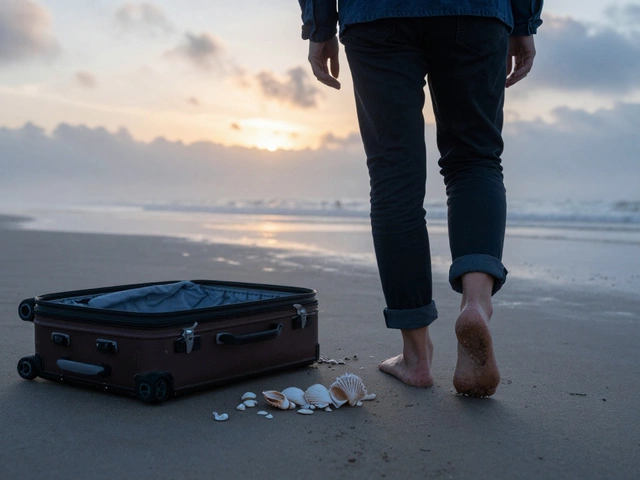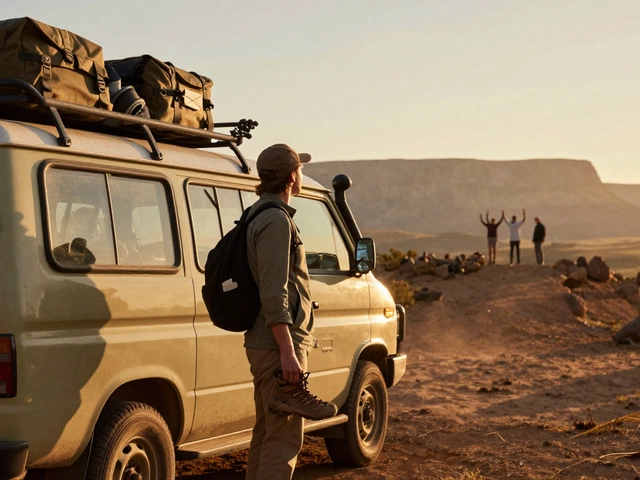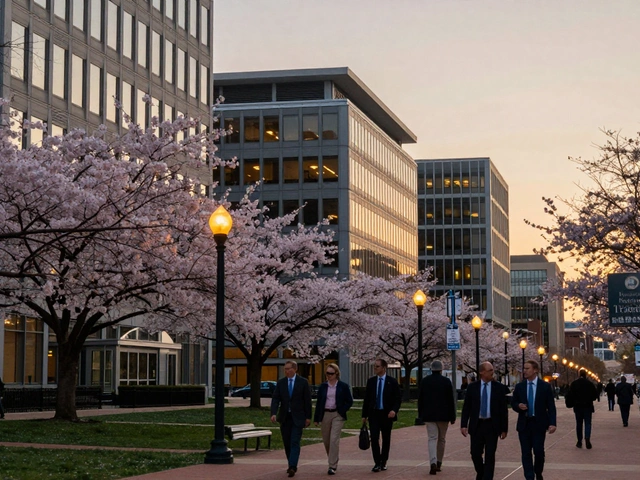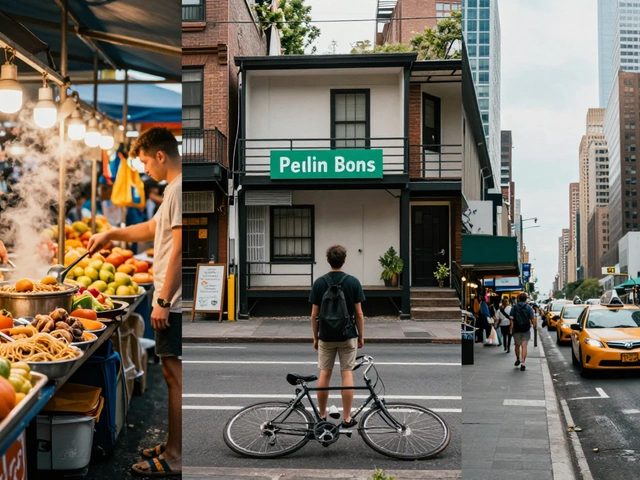Trip Cost Calculator
Estimate your trip costs for 2025 using real data from the article. Input your travel details to get a personalized budget.
Enter your travel details to see your estimated cost.
How much should an average trip cost? There’s no single answer, but there are real numbers you can use to plan without guesswork. If you’re thinking about taking a week off this year, you’re not alone. Millions of people are asking the same question - and most of them are overpaying because they’re using outdated or vague estimates. Let’s cut through the noise.
What ‘Average’ Actually Means for a Trip
When people say ‘average trip cost,’ they’re usually talking about a domestic or regional getaway for two people lasting 5-7 days. That’s the baseline most travel sites use. But ‘average’ doesn’t mean ‘typical’ - it’s skewed by luxury trips and last-minute splurges. The real median cost for a mid-range vacation in 2025 is between $850 and $1,400 per person. That includes flights, lodging, food, local transport, and a few activities. Not luxury. Not backpacking. Just a solid, comfortable trip where you don’t stress about every dollar.Let’s break that down. For a trip to a nearby city or coastal area - say, Cape Town from Port Elizabeth - you’re looking at:
- Flights: $120-$220 round-trip (booked 4-6 weeks ahead)
- Lodging: $60-$100 per night for a clean, centrally located guesthouse or hotel room
- Food: $30-$50 per day (mix of local eateries, markets, and one nice meal)
- Transport: $15-$30 for taxis, buses, or rental car share
- Activities: $40-$80 (museum tickets, guided walks, nature parks)
Add it up: $1,000-$1,300 total for two people. That’s it. No hidden fees. No resort taxes. No upsells.
Where Most People Overspend (And How to Avoid It)
The biggest mistake? Assuming everything costs more than it does. You don’t need to book a 5-star hotel to have a great trip. You don’t need to eat at every tourist restaurant. You don’t need to rent a car if the city has good public transit.Take food. Many travelers budget $70-$100 per day for meals, thinking they need to dine out every time. But in most mid-sized cities, you can eat well for $25-$35 a day. Buy fruit from a street vendor. Grab a sandwich from a local bakery. Have a braai (barbecue) at your guesthouse. In South Africa, a good meal at a local spot costs less than $10. In Portugal, it’s €8. In Mexico City, it’s $6.
Flights are another trap. People wait until the last minute and pay $400+ for a short trip. But if you book 4-6 weeks out, use incognito mode, and check Tuesday and Wednesday departures, you’ll often find fares 30-50% lower. A round-trip from Johannesburg to Durban can drop from $280 to $140 if you’re flexible.
And don’t fall for ‘all-inclusive’ packages unless you’re going to actually use them. Most people pay $1,800 for a resort that forces them to eat the same food every day and limits where they can go. You could spend $1,100 on a hotel and meals separately - and still have more freedom and better food.
International Trips: What You Should Expect
If you’re thinking beyond your own country, here’s what a 7-day trip costs in 2025 for two people:| Destination | Flights (Round-Trip) | Lodging (7 Nights) | Food & Drink | Local Transport | Activities | Total Estimated Cost |
|---|---|---|---|---|---|---|
| Mauritius | $500 | $700 | $350 | $80 | $120 | $1,750 |
| Portugal (Lisbon) | $450 | $630 | $300 | $70 | $100 | $1,550 |
| Thailand (Chiang Mai) | $600 | $420 | $210 | $40 | $90 | $1,360 |
| Mexico (Cancún) | $550 | $560 | $280 | $60 | $110 | $1,560 |
| Botswana (Maun) | $380 | $840 | $250 | $50 | $200 | $1,720 |
Notice something? The cheapest destinations aren’t the ones with the lowest flight prices - they’re the ones where daily spending is low. Thailand and Botswana have expensive flights but cheap food and lodging. Portugal has mid-range flights but very affordable meals and transit. That’s where you get the best value.
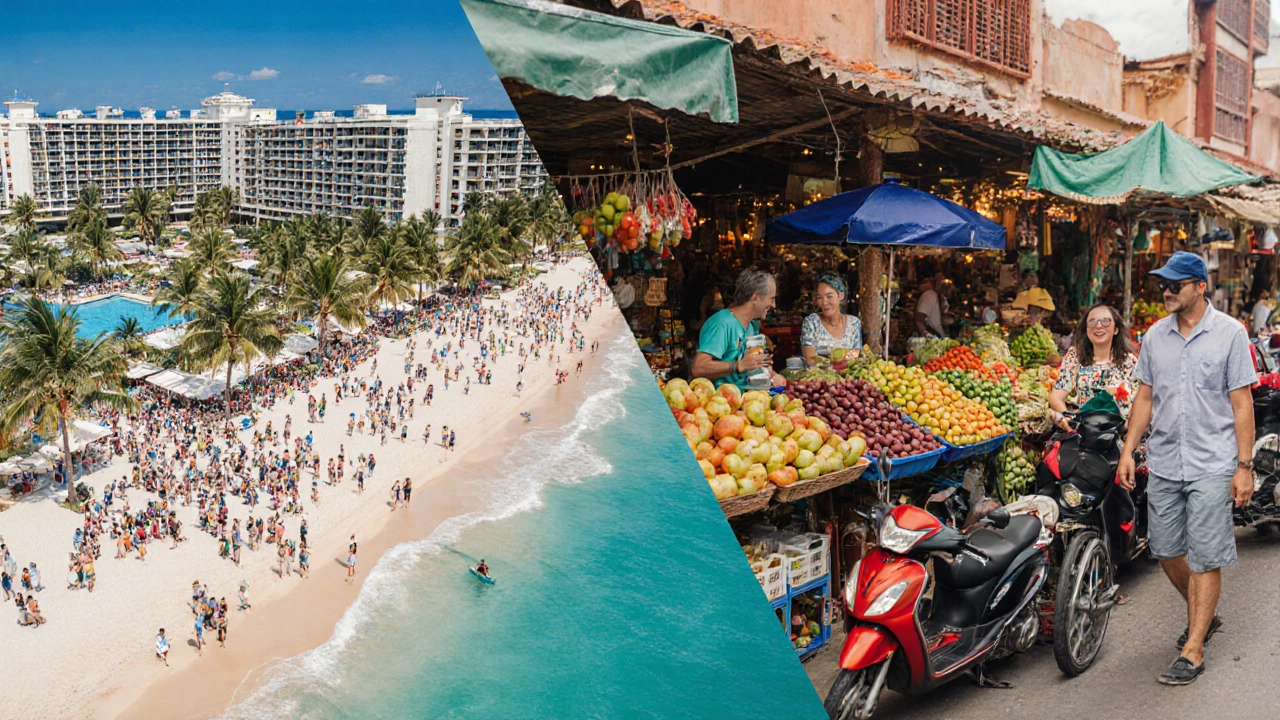
When 0 Is Enough (And When It’s Not)
Can you do a trip for $500 per person? Yes - but only under specific conditions. You need to:- Travel during the off-season (April-May or September-October)
- Stay in hostels, guesthouses, or Airbnb rooms (not hotels)
- Use buses or trains instead of flights
- Eat only local street food or cook your own meals
- Limit activities to free or low-cost options (hiking, beaches, markets)
That’s a backpacker budget. It works for young travelers, digital nomads, or people who prioritize experience over comfort. But if you’re traveling with kids, older parents, or just want to relax without worrying about every meal, $500 won’t cut it. You’ll end up exhausted, hungry, and stressed.
That’s why the sweet spot is $850-$1,400. It’s not luxurious. But it’s enough to sleep well, eat well, move around easily, and enjoy a few special moments - like a sunset cruise, a guided nature walk, or a dinner with local music. That’s the kind of trip people remember.
How to Build Your Own Trip Budget
Here’s a simple formula you can use for any destination:- Find your flight cost: Use Google Flights and set a price alert for your dates. Add $50 for baggage fees if needed.
- Estimate lodging: Multiply the average nightly rate by 7. Use Booking.com or Airbnb and filter for ‘superhosts’ or 4+ stars. Avoid resorts unless you’re staying 10+ days.
- Food: Multiply $30 by 7. That’s $210. If you’re in a high-cost country like Japan or Switzerland, bump it to $40/day.
- Transport: Add $20-$40 for local transit. If you’re renting a car, add $150-$250 for the week, including fuel and insurance.
- Activities: Pick 3-4 things you really want to do. Research ticket prices. Add $100-$150.
- Buffer: Add 10% for emergencies - a missed bus, a lost phone charger, a sudden rainstorm that ruins your plans.
That’s your budget. No apps needed. No spreadsheets. Just basic math.
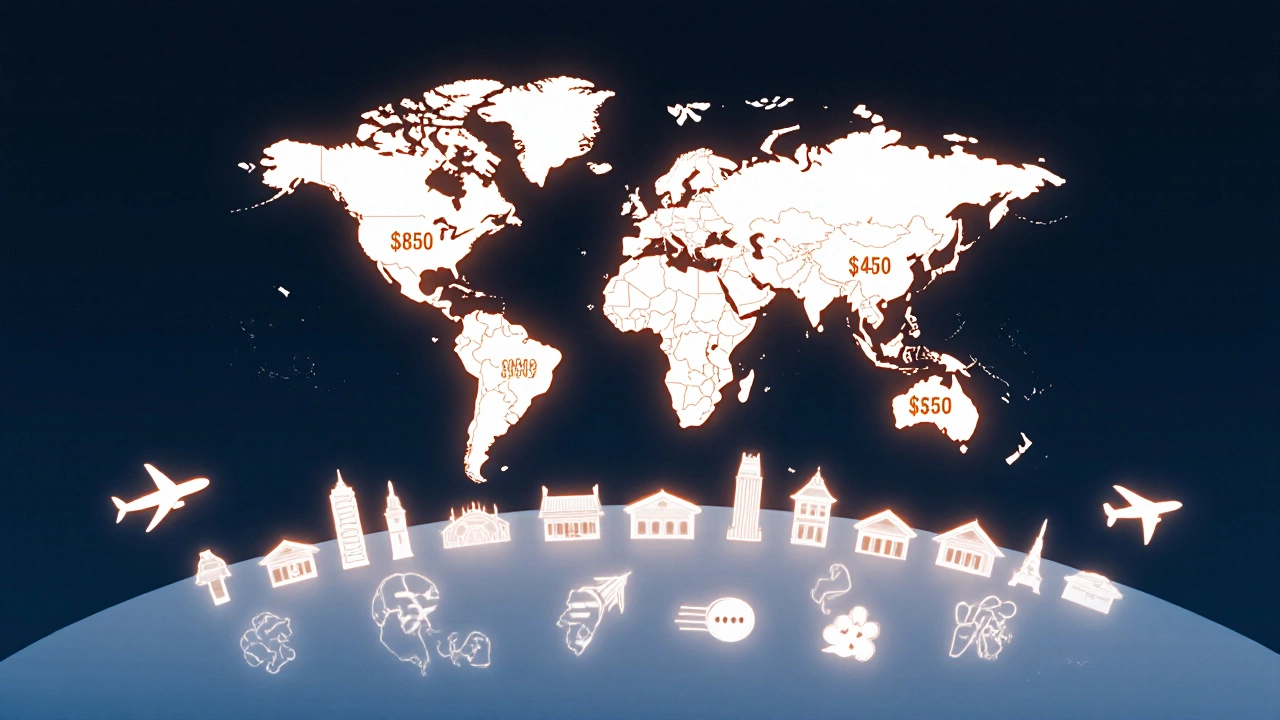
When to Book and How to Save
The best time to book a trip is 4-8 weeks before departure. That’s when airlines and hotels release their last discounted rates - but before prices spike. Booking too early (3+ months) means you might miss a sale. Booking too late (under 2 weeks) means you pay full price.Here are three real ways to save:
- Use local travel sites: In South Africa, check Travel24 or Travelstart. In Europe, use Omio for trains and buses. They often have deals not listed on Expedia or Booking.com.
- Travel mid-week: Flights on Tuesday and Wednesday are often 20% cheaper than Friday or Sunday.
- Bundle your own deal: Book flights and lodging separately. You’ll almost always save money. A $700 flight + $600 hotel = $1,300. A bundled package for the same dates? $1,600.
And skip the travel insurance if you’re going somewhere low-risk. Most credit cards offer basic trip protection. If you’re traveling to a place with political unrest or extreme weather, then buy insurance - but only from a reputable provider like Allianz or World Nomads.
What You Shouldn’t Spend Money On
Here’s what most people waste money on - and why you shouldn’t:- Travel pillows and fancy luggage: You don’t need a $200 suitcase. A $40 duffel bag works fine.
- Pre-paid SIM cards: Buy a local SIM at the airport. It costs $5 and gives you 10GB of data.
- Guided tours for everything: You can walk the streets of Lisbon, Cape Town, or Mexico City on your own. Download a free offline map. Google Maps works fine without Wi-Fi.
- ‘Must-have’ souvenirs: A $30 keychain won’t make your trip memorable. A photo of you eating street food in Bangkok? That will.
Spending money on experiences - not things - makes trips last longer in your memory.
Final Thought: It’s Not About the Price - It’s About the Value
The question isn’t ‘How much should a trip cost?’ It’s ‘What kind of trip do you want?’If you want to come back relaxed, refreshed, and with great stories - spend $1,000-$1,400. If you want to come back exhausted and broke - spend $500. There’s no magic number. But there is a smart way to spend.
Plan ahead. Know your limits. Skip the hype. And remember: the best trips aren’t the most expensive ones. They’re the ones you actually enjoy.
Is $1,000 enough for a week-long trip?
Yes, $1,000 is enough for a solid 7-day trip if you’re traveling domestically or to a low-cost destination like Thailand, Mexico, or parts of Southern Africa. That budget covers flights, lodging, food, local transport, and a few activities - as long as you avoid luxury hotels and tourist traps. Stick to local eateries, public transport, and free attractions, and you’ll have a great experience without overspending.
What’s the cheapest country to visit from South Africa?
From South Africa, the cheapest international destinations are Namibia, Zimbabwe, and Mozambique. Flights are short and affordable, lodging is budget-friendly, and meals cost less than $10. For example, a week in Maputo, Mozambique, can cost under $800 total for two people. If you’re looking for something farther, Thailand and Portugal offer the best value for money when you factor in flight prices and daily spending.
Should I book flights and hotels together or separately?
Always book them separately. Bundled packages look convenient, but they’re often 20-30% more expensive. Use Google Flights to find the best airfare, then search for lodging on Booking.com or Airbnb. You’ll get more options, better reviews, and lower prices. Plus, if your flight gets canceled, you won’t lose your hotel booking too.
How much should I budget for food per day?
Budget $30-$40 per day for food if you’re eating mostly at local spots, markets, and casual restaurants. In cities like Cape Town, Lisbon, or Chiang Mai, you can eat well for under $25 a day. Skip the tourist restaurants near landmarks - they’re overpriced. Instead, follow the locals: look for places with a line of residents waiting to eat. That’s your sign it’s good and affordable.
Is travel insurance worth it?
It depends on where you’re going. For most domestic trips within South Africa or nearby countries, you don’t need it - your credit card likely covers basic delays or lost luggage. For international trips to places with unstable infrastructure, high medical costs, or risk of natural disasters (like Thailand or Mexico), $50-$80 for a week of coverage is smart. Skip the extras like ‘cancel for any reason’ - they’re not worth the cost.


